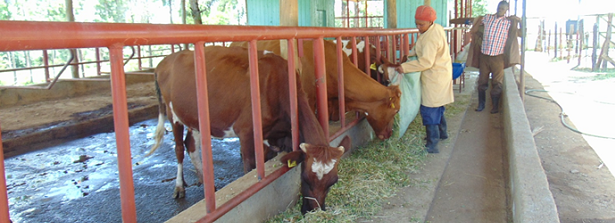Innovations for Sustainable and Profitable Intensification of smallholder Dairy in Kenya (ISPID)

Duration: January 2016 – January 2019
Project information
Aim: Intensification of smallholder dairy enhances food and wealth security, but can be a cause of environmental and human health risks. This project aims to empower smallholders to integrate good production practices, efficient resource use, postharvest handling, value addition and adaptive capacity to shocks with more sensitivity to minimize externalities of intensification in Kenya highlands.
Objective: Intensification processes of smallholder dairy as presently promoted in Kenya for economic development is failing to adequately empower smallholders in applying integrated management practices for sustainable and profitable dairying. Consequently, the risks are high for accelerating externalities and for loss of livelihood opportunities from dairying. This project’s overall objective is to apply the principles of research-into-use and knowledge co-creation to empower the ultimate and intermediate target groups with capacity to integrate knowledge, skills and attitude change.
Method: Application of: (i) Good Dairy Management Practices for assuring product safety to consumers; (ii) Efficient resource use for increasing herd productivity and incomes with minimized externalities of intensification; (iii) Better understanding of development interventions supportive to inclusive sustainable dairy intensification for the vulnerable groups; (iv) Strategies for building resilience to climatic and market shocks and buffering feed and market seasonality; and (v) Reduction of postharvest milk losses and increasing value adding to milk.
Country: Kenya.
Dutch policy goals: Increased sustainable agricultural production; Improved access to better nutrition; and More efficient markets.
Progress reports
Year 1: Insight – The project implementation is now one year since 24.01.2016. To date 10 modules of Good Dairy Management Practices training have been offered to 125 (47 female and 53 male) farmers, held 3 steering committee meetings and constructed a cow burn for dairy campus at Mt Clara. Three MSc students have been recruited of which one has collected data and is analysing on farm biosecurity and animal welfare while the other two are completing course works. Farmer beneficiaries have registered their own cooperative to support their dairy farming commercialisation strategy. Baseline survey on farms results shared with farmers and annual monitoring will be implemented.
Innovation – innovations already in use by farmers are growing of mixed fodder species blended with drought tolerant species, silage making from napier and maize, practical knowledge of cowsignals for understanding what cows need to stay healthy and productive.
Policy and Practice – Knowledge co creation with farmers stimulates high level participation and quick productivity outcomes at the household level. Farmer beneficiaries are have quickly adopted the technologies and are investing in sustaining the benefits of the project. They registered their farmer cooperative by individual share contribution, some bought books –Cow Siganals Basics after use in training, they contributed to costs of farmer exchange, and some are investing in improving biosecurity and housing of their herds.
Year 2: ISPID is a partnership being implemented in Kenya by three partners (Mt. Clara Mtakatifu, Egerton University and Wagningen WUR Livestock Research). The target beneficiaries are 128 rural smallholder farmers who are vulnerable to recurring droughts, which pose sustainability threats to their dairy intensification process. This project is applying the principles of research-into-use and knowledge co-creation to empower the ultimate and intermediate target groups with capacity to integrate knowledge, skills and attitude change. The project milestones attained in the second year of implementation:
Stimulating farmer uptake of Good Dairy Management Practices focused on milk hygiene, on- farm biosecurity, animal welfare and cow claw disorders. Farmers have been sensitized on soil fertility testing, trained to produce bulk seeds and conserve fodder, make silage and to record animal performance. Outcome include farmers utilizing high value feeds to reduce seasonal feed scarcity and to sustain milk production during dry spell, enabling them stabilize their milk supply for home consumption and for sale to earn some income.
Farmers developed Community Action Plan Strategy which has focused their efforts to milestones. A milestone realised is formation, registration and purchase of shares in a cooperative society. Gender sensitivity is mainstreamed in the management of the cooperative with women in charge of positions of the treasurer, vice secretary and chairing two sub committees. Using the cooperative, farmers have applied for 3000 litres milk cooler and are negotiating with Egerton University Dairy plant for contract to deliver 250 litres daily.
Formation of farmer cooperative contributes to reduction of postharvest milk losses and increased value adding to milk. This is in response to observed marginal improvements changes in hygienic milk handling practices after one year of training in regards to mastitis testing, use of plastic containers, observing antibiotic withdrawal period and discarding of milk from sick and mastitis cows.
The project interventions in building resilience to short term shocks –climate, milk price fluctuations, feed seasonality – have involved 128 farmers. They have been trained in fodder tree nursery establishment, 2,000 seedlings distributed to 50 farmers to support community seed system in sustaining multiplication of quality seeds. Farmers have hired farms to produce fodder seeds and commercial fodder for sale.
The project is supporting four MSc students in their research projects in on-farm biosecurity and animal welfare measures, cow claw disease management, climate resilience strategies and farm management style of positive deviant farmers. Three dairy practice briefs have been produced; Baseline situation in smallholder dairy intensification; Milk yield gap in smallholder farms; On-farm bio-security and animal welfare status on smallholder dairy farms.
